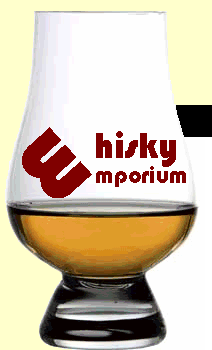|
Home
|
Whisky & Chocolate |
Collecting Whisky |
Dram-atics | Tasting
Notes | Contact &
Impressum | Wall of Friends
|
|
Dram-atics
The whisky world as seen by an eccentric Bavarian exile |
|
|
Please
contact
me here to comment on this Whisky Round Table, I'll include all replies!
|
See all
other Whisky Knights' topics
| |
 |
|
Oct. 2010 sees the Whisky Knights drop in to Schloß Emporium
As you know by now, each month twelve whisky bloggers and
commentators gather at their cyber Round Table for a
discussion about a specific whisky-related topic. This month
it's my turn to lower the drawbridge and invite this
formidable duodecuple to Schloß Emporium as I ask them to
share their pontifications about the concept of bottle
ageing when it comes to our favourite liquid nectar.
|
|
| |
I have
recently had a few discussions relating to the differences
between whisky bottled today and that bottled in past years. A
good example of this is the comparison between two MiltonDuffs
which I recently tried. They were both OB 12y offerings, one
bottled in the early 1980's, the other in the late 1980's and
they were drastically different. In addition both are completely
different to more modern Miltonduff 12y expressions. Also,
compare the OB Talisker 10y of 30 years ago with the 'same'
offering of today and I am sure you'll find them completely
different. One of my discussions on this subject led to my
counterpart suggesting that any differences in taste were due to
'bottle ageing' and could not be explained solely by differences
in distilling procedures or raw meterials being used.
So, this month's question is as follows;
I know that officially the ageing or maturation of whisky is
defined as the time spent in oak casks, but apart from that, do
you believe in any form of 'bottle ageing' being accountable for
changes in the flavour of whisky over a period of years whilst
still in the bottle? (I am also talking about originally
sealed and unopened bottles, as we all know that once a bottle
is opened, oxidisation of the whisky can and often does occur).
|
|
|
| |
Joel & Neil of Cask Strength
Joel and Neil met while working as A&R guys
for two different major record labels. Mortal enemies at the
time, they were brought together by a love of whisky and the
fact that they happened to live near each other in South
London. Now running the blog, writing for various
publications and involving themselves in creative marketing
for drinks brands (whatever the hell that means), in their
spare time they debate various things such as “who would win
in a flight, Christopher Reeve (if still alive) or Stephen
Hawking” or “If noise left physical detritus, would people
be employed to sweep it out of clubs into special bins on a
Sunday morning?”. Their current fav whisky is Ardmore
Traditional Cask. Delicious and cheap. Much like many of
Joel’s former girlfriends.
|
|
 |
|
| |
“Here are the results from Caskstrength.net
judges”
We don’t believe whisky ages in the bottle at
all. Distilleries strive to make a consistent flavour New
Make Spirit, which is what all the pipes and dials and charts
that you see when you walk around a distillery are for:
consistency. Once this consistent product is placed into
inconsistent wooden barrels, stored in different places in
different warehouses for different lengths of time and under
variable weather conditions, you get a wide range and variety of
flavours of whisky from one distillery.
It is then the job of the master blender
to use this palate of casks to create an age statement single
malt whisky as closely as he can to the release which followed
before. This is a little like Chinese whispers however, and if
the casks in the warehouses don’t have the same characteristics
as the last batch of casks used, (s)he must create something as
close as possible to the last batch. If the slight changes are
then modified again a year later, then again a year later and
then again a year later, etc etc, you will end up with a
slightly different whisky 10 years on.
Other factors may be the malt used (currently
optic and Oxbridge are favs, but this may change in 2, 3 or 4
years time) and crucially who the master blender is. If that
person changes, then the whisky may well change. Style may also
be adjusted for what the markets are currently demanding. If
feedback from a large market says that they want heavily
sherried, then you may err on the side of an extra European Oak
cask in the mix.
We do, however, think that more obvious batch
numbers on bottling (a la Abalour A’Bunadh) is a good idea, as
clearly there is batch variation and real geeks like us will not
want to have to spend our life looking at tiny bottle plant
computer print on the backside of a bottle!
|
|
| |
 |
|
Chris & Lucas of Edinburgh Whisky Blog
Philanthropists, patrons of arts, peace negotiators, people
who know everyone and everything while being modest to the
point of near-invisibility, Chris and Lucas are considered
to be two of the greatest personas of the 20th and 21st
centuries, alongside Ghandi, Einstein and Justin Bieber.
They never sleep and never eat, drink only boiled whisky and
can communicate telepathically with humans and animals.
Until recently it was believed they were two penniless
recent graduates living in Edinburgh but that was proven to
be just a cover-up in an ongoing journalist investigation
run simultaneously by all the major daily newspapers of
Western Civilisation. The break in the investigation came
when press obtained photos of Chris and Lucas sitting
directly to the left and right of Bill Clinton's daughter
during her wedding reception. This year C&L have been
shortlisted for all the Nobel Prizes and it is believed that
on Saturday they will appear on the UK TV talent show 'The X
Factor' helping Cheryl Cole judge the contestants at the 'Judges'
Houses' stage of the competition.
|
|
| |
I'm glad
you brought this topic up, Keith. There isn't enough uber-geeky
technical chat on-line for my liking.
While
beer and wine conditioning process is a function of yeast
and exposure to oxygen may lead to staling, whisky maturation is
not a biological process but rather a chemical one and requires
circulation of oxygen to occur.
My organic chemistry knowledge is far from
satisfactory so correct me if I'm wrong but what we mean by
good maturation isn't simply spirit soaking up flavour compounds
present in oak (like vanillin or tannins) but also alcohols oxidising
to acids, aldehydes (mainly acetaldehyde which commonly derives
from ethanol, copious amounts of which are present in whisky to
our delight) and then further to esters, ketones and other yummy
compounds, the stars of the perfume world and unsung heroes of
whisky.
It can be therefore concluded that some
flavouring of spirit by adding oak chips to the bottle can occur
while proper maturation this way is, in my humble opinion,
impossible.
|
|
| |
Jason of GuidScotchDrink
Hailing from Burns country, Jason has been tasting whisky
and leading whisky tastings for over 13 years. He also leads
whisky tours of Scotland in search of Guid Scotch Drink! |
|
 |
|
| |
I have no doubt that "bottle aging" of
some description occurs over time, even with originally
sealed and unopened bottles. No cork can possibly keep out all
oxygen, and no foil wrapper, in consort with the cork, can
possibly halt evaporation.
Few of us are surprised when the level
of whisky in a sealed bottle drops with the passage of time, so
why should we be surprised when there occur subtle changes in
flavor? The evaporating alcohol exits the bottle, ergo, the
whisky is changed. Oxygen enters the bottle and invites
oxidation to some degree, ergo, the whisky is changed. Now, if
you're asking me what flavors are likely to change, I will
suggest fruity and floral notes, but that is merely supposition
and conjecture. Many of us have noticed pronounced sulfury
notes when first pouring a heavily sherried whisky only to find
them strangely absent after the poured contents have been
exposed to a healthy dose of oxygen and time. Unfortunately, I
haven't been able to test this with unopened bottles over time.
Perhaps some of our readers can attest to this with personal
anecdotes.
I think the problem we encounter when referring to this
process as "bottle aging" is that, semantically, it sounds akin
to "bottle maturing" and we've been told long enough by
distillery owners and professional Scotch Whisky Associations
that whisky DOES NOT, with penalty of death, mature after
bottling. Of course it doesn't, it matures in oak casks, but it
is most definitely still capable of interacting with the
atmosphere long after it's been placed in it's shiny, glass
sepulchre, inhaling trace amounts of oxygen while exhaling dusty
breaths of alcohol.
|
|
| |
 |
|
Joshua of The Jewish Malt Whisky Society
Joshua is 36 and is first and foremost a husband and a
father. He's also a cigar smoking, whisky tasting, beer
swilling, kosher keeping vegetarian. He runs a whisky
society which currently has about 22 members and is also the
author of The Jewish Single Malt Whisky Society blog which
focuses on unique reviews, interviews with key people within
the whisk(e)y industry and opinions on Scotch, Japanese
Whisky & American Whiskey. Joshua has been a musician for
more than 23 years playing in various punk/avant-garde/progressive
bands for all 23 of those years. His current and longest
lasting work is as part of the American power trio Kimono
Draggin'
(http://www.kimonodraggin.com)
which plays throughout the US and Europe. |
|
| |
Keith,
this is an interesting question. One that may be better
answered by one of those fancy-pants uptown, know-it-all college
grads with bigger diplomas than
me (sadly, I doubt I'll ever get
around to getting my phD…).
Seriously though, with regards to the build-up to your question
where you pointed out two 12yo MiltonDuffs which were so very
different but bottled in the same decade - I would venture a
bold guess in that there would be differences in the actual
fluid before they were bottled.
I'll give you a very basic example of Glenmorangie's new-ish
"Original" which replaced their 10yo. Both are 10 year old (minimum
age) whiskies. Both are comprised of first fill & refill
ex-bourbon casks combined to create a certain flavor profile.
One of the reasons for the name change, bottle style change,
etc… (though let's take all of the marketing wizardry out of the
picture) was that Glenmorangie ran out of the old fluid! They
had to come out with a new 10yo product to replace the old.
So here we have an example of a 10yo Glenmorangie whisky
produced in the early to mid 2000's differing from a 10yo
Glenmorangie which was produced in the later 2000's (the
Original, if I'm not mistaken, came out in 2007). This is a
constant for every whisky producer. Eventually, these
distilleries run out of fluid for their 10yo, 15yo, 25yo, etc…
and these whisky expressions are relaunched with new fluid (and
sometimes with a big marketing push).
While I do not believe in bottle aging (or Santa Claus for that
matter), I would venture to guess that there could be some
changes to the fluid if a bottle is not stored properly.
Let's run a test, shall we? If we took two bottles of… let's
say Springbank 15yr (oh, you are a sexy little dram, aren't you!?)
and stored one in a cabinet and the other on a window sill for 3
years, the direct sun & temperature change would affect the
fluid (and the cork, I gather) in some way.
You can take the window sill whisky, I'll take the properly
stored whisky.
L'chayim/Slainte/Cheers!
Joshua Hatton
|
|
| |
Chris of Nonjatta
Chris is a 39-year-old British journalist living in central
Tokyo. He has a
5-year-old son and not enough drinking time. He works for a
Japanese newspaper but his real obsession at the moment is a
book about Japanese alcohol which is due out at the end of
the year. |
|
 |
|
| |
I don't
think I am really in a position to give an informed answer on
the bottle aging issue because I just don't have any relevant
expertise.
My
guess is that there is some change in an unopened bottle. I
know that some shochu distillers in southern Japan bottle age
their distilled spirit and seem to believe the alcohol changes.
I did
have a very interesting conversation with the owner of Bar Crane,
a whisky/grappa bar in Ikebukuro, Tokyo, about the differences
between different years of standard distillery bottlings and he
was insistent that there are huge variations due not to bottle
aging but to changes in the way the whisky is made over time.
He has a
comprehensive selection of Macallans dating back decades and
says that, in his opinion, the quality has fallen off markedly.
I didn't have enough cash in my pocket to judge for myself by
tasting his range but, in principle, I would say the maintenance
of complete consistency over decades is highly unlikely.
|
|
| |
 |
|
Peter of The Casks
Choosing to explore his
Scotch-Irish heritage through his love of Scotch whisky,
Peter's been a whisky fan for as long as he feels
comfortable remembering. After a long stint as bike racer,
(which doesn't really mix all that well with a serious
whisky habit) he hung up his silly lycra costumes, picked up
a couple of Glencairn glasses, an Ardbeg, some Van Winkle
and turned what was previously a somewhat disreputable
practice into something more "academic" and productive. He
and his dad now drive his brother and step-mom nuts when
they get into deep philosophical discussions about what
bottle to buy next. |
|
| |
Well, I guess that
the party line is that once in a bottle, a whisky doesn't
really change much. Obviously, in the wine and beer world,
bottle aging plays an important role, but in the whisky world
any change is probably not intended. I suppose in the MiltonDuff
and Talisker examples, you'd have to consider the distilleries
making conscious changes to the flavor profile over the years
but I think there are reasons to believe its time in the bottle
can change a whisky.
The biggest reasons might be environmental. In the wine
world, for example, some wineries will hold back bottles of a
vintage and cellar them properly for years. If, while in Italy,
you open up a nice Barolo at the winery where it was produced,
bottled, and stored at, it will taste far different (and
probably better) than the same bottled vintage that's taken a
truck ride to a container ship, sat in a hot warehouse in NYC
for a week and then jostled around for another few days on a
truck ride out to San Francisco and your waiting glass. Even the
best booze isn't handled with kid gloves by everyone who touches
it, there's a lot of sloshing around until it finally hits the
shelves.
Does a bottle that's been through
a lot of shipping trauma suffer?
How many "climates" has it gone
through before ending up in your glass?
Will whisky shipped in the hot
summer lose a bit compared to whisky shipped in a cold Winter?
How much influence does the cork have on taste?
I'd
be pretty surprised if environmental considerations like
these have zero effect on a whisky...but is the effect
measurable? These would be more immediate effects on a bottle,
I'm not sure about effects over a period of years. If we're to
believe blenders ideas about letting a blend "marry" for a few
months before bottling, then you'd have to think that a
non-single cask malt would also go through a similar marriage,
with the flavors from each cask making up the "single malt"
mellowing and incorporating more over time.
|
|
| |
Matt & Karen of Whisky for Everyone
Matt currently works at The Whisky Shop's
London branch but cut his ‘whisky’ teeth at the famous Royal
Mile Whiskies. Karen is driven by being told that “girls
don’t drink whisky” and is going about proving that
statement wrong! Both are habitual barflys, who are looking
for the next interesting drink to sample. Three years ago,
neither knew anything about whisky and struggled to find
anywhere suitable online to teach them and other whisky
beginners. So they decided to write such a site themselves
and document their whisky education as it evolves. The
Whisky For Everyone blog was born and from this, the website
whiskyforeveryone.com has grown. That whisky education
continues …. |
|
 |
|
| |
We have always been told or have read
that whisky only ages in the cask and not in the bottle, so it
was interesting to find this question raised. Since it was
posed a couple of weeks ago, we have spoken to a number of
people in the whisky industry about the possibilities of this
happening.
Is everything that we have read or been
told to date, ultimately wrong? They have all stated
categorically that no ageing takes place within an unopened
whisky bottle, as there is minimal contact with any air and the
alcohol ABV strength is too high (this is true for most spirits
and unlike wine, which has a much lower ABV).
The people that we asked have put the
changes in any one expression of whisky down to one thing – the
move away from traditional selection methods to a more highly
scientific approach to whisky making. Even up until 10 years
ago, most distilleries selected their whiskies through a
combination of the warehouse manager and the master distiller.
Now, almost exclusively, distilleries and
companies use science from the beginning of the whisky making
process – barley is selected on a micro nutrient level and each
part is then measured in technical sensory labs. This creates
consistent but different whiskies from the past and takes away
nuances within the flavour profile of a mass marketed whisky.
So have we changed our minds about this – no!
|
|
| |
 |
|
Gal of Whisky Israel
Gal
is a
software geek in the daytime and whisky geek and fanatic
24/7 . Father of 2 lovely Kids, 35 years old and Living
in Kfar-Saba (a suburb of Tel Aviv). Founder and Editor of
Whisky Israel; The only whisky
blog from the holy land written in English. Whisky Israel features
tasting notes, and whisky musings and is aimed at the
international whisky community rather then
at the rather small Israeli whisky market. Whisky Israel has
recently evolved into a Whisky tasting society which
convenes once a month and is currently growing. In addition
to Whisky Israel, Gal runs a leading Hebrew culinary blog -
"Foodnwine.co.il"
and enjoys Good food
and great Jazz.
Gal
is an internet 'freak' and can be found tweeting 24/7.
|
|
| |
I am not a whisky veteran as some of you
(and Keith is). I've been drinking whisky only for a few years
now, but I do not believe in miracles :) We are always told by
so called 'whisky experts' and people with PHDs in chemistry
that Whisky does not change after bottling (given no air is
allowed to enter the bottle and that the cork is in good shape).
I tend to agree.
So how can we possibly explain that whisky over
the years does not taste 'the same'?
Most people think of 'Single Malts' as the
purest form of whisky. I get asked about whisky quite a lot
being considered a whisky 'expert' by those who don't know much
about the nectar of the gods (AKA whisky). Time and time again
people get confused between 'single cask' and 'single malt'. We
all know that Single malt really means that the spirit was
distilled and aged in the same distillery, but the end product,
say the 10,12,18,20 year old expression is always a vatting of
many casks, distilled at many points in time, using barley which
sometimes changes and casks that were available at that time
etc.
Essentially, a Talisker '10' made
a few decades ago and bottled
then, has to somehow be
different than the Talisker bottled yesterday.
But
yes. I know Master
blenders do use their amazing abilities to maintain a certain 'profile'
and 'color' (given we don't use the evil caramel)
but there is only so
much that can be done to achieve that,
given stocks do differ over a large span of time.
I posted my Notes and impressions a few
weeks ago about a Glenmorangie tasting I
attended not long ago. In that tasting the importer spoke about
the change of the Glenmo profile after LVMH took over and that
the 'Original' is not really the same as it was before, but
changed to fit the palates of a larger audience and to match the
'profile' LVMH wanted Glenmo to have.
So, as you can see, all those factors do
contribute to the 'change' whisky through the years... Magic, it
is not.
Trends come and go, and whisky
profiles change with them. More Peat, Less spice, more pepper
etc. Who knows how the Ardbegs and Taliskers of 2050 will taste?
(i'm betting super peaty, but who
knows? )
Slàinte!
Gal.
|
|
| |
Ruben of WhiskyNotes
Ruben lives in
Belgium
although he has also lived in Spain, he is a musicologist
and now a web designer. He's 32 years old and tastes at
least 300 new whiskies a year. He specifically likes Brora
and Karuizawa as well as anything old and sherried. He runs
his "WhiskyNotes" blog where he keeps up not only with
whisky news and events, but also archives all his tasting
notes. |
|
 |
|
| |
I don’t think differences between a Miltonduff
from the early 80’s and late 80’s can be explained by bottle
ageing. I’m even more certain the old Talisker 10 is
different from recent bottlings only because it was distilled,
monitored, matured and handled differently.
On the other hand: yes, I’ve experienced some
of the effects that have been described as ‘Old Bottle Effect’
(lower peat levels, metallic notes, a certain dustiness /
mustiness). I do believe a whisky changes inside a bottle due to
interaction with light, glass, air… In fact, a liquid NOT
changing over the course of 30 or 40 years would be more
surprising to me – in the end nothing is perfectly stable.
It’s quite an anorak discussion I guess… Most
people will never experience bottle ageing, and I’m afraid
recently some people are trying to discover it even when it’s
not there. You need a very long time before it starts to happen,
and you’ll never know whether the whisky has changed or just
your perception of the whisky.
|
|
| |
 |
|
Mike of Whisky Party
Whisky Party is Mike, Mike, and Dan who, although living in
America, are exploring the world of Scotch whisky one dram
at a time. They are all under 35 and
concentrate upon Scotch whisky in the hope of helping to demystify the world of
Scotch and whiskey drinking and help folks find good
whiskies at good prices. |
|
| |
It's
my understanding, picked up from people much more learned
than I in the art of whisky making, that there is no aging or
alteration of the spirit once whisk(e)y is in the bottle. That
said, it's easy to see why any number of people - particularly
newcomers to whisky - might find reason to disbelieve the
experts.
We live in a culture dominated (regrettably) more by wine and
beer than whiskey, both of which change considerably whilst
in the bottle. Wine is often valued higher as it matures
in the bottle. And while a few weeks resting in the bottle
can help a beer's flavor, if left too long things can go sour
(just ask any college freshman or a Budweiser marketer looking
to tout their latest "born on" date). In this
context, the inert nature of a whisky's flavor is something of
a counter-intuitive anomaly in
our drinking culture.
The second reason, of course, is batch variation. From
tiny changes in the (also aging) distilling equipment, to new
sources of water and wood, it's tough to keep things 100%
identical from batch to batch, let alone decade to decade.
Small variations over time add up, accounting for noticeable
differences in taste.
Indeed, avoiding this sort of batch variation is one of
the goals of the major blends, which strive to produce the same
flavor time and time again. It would be interesting to
participate in an "historical tasting" of one of the major
blends like Johnnie Walker Black. If I worked as a marketer for
a major whiskey
company in possession of one of the big blends, I'd arrange for
just such a tasting as a way to educate drinkers about the blend
- a dram each from 1980, 1990, 2000 and 2010.
|
|
| |
Mark of Glasgow's Whisky
Mark
is 35 and has lived in Glasgow all his life. He runs a
festival and a forum as well as the blog which is really
just a mish-mash of what’s going on in his life and brain. A
previous career as a web designer has proved handy but the
whisky is now taking over more and more... |
|
 |
|
| |
Yes and
no. I think it likely depends on the whisky and what is done to
it before it is bottled. Recently I tried a dram of Auchentoshan
which was bottled straight from the cask using a valinch which
meant a good amount of the charred cask was deposited at the
bottom. I would assume that the whisky was probably still
reacting in some way with these tiny, black flakes. Since it was
not filtered in any way I would also hesitate a guess that all
the compounds would, to some degree, merge for a little while
longer in the bottle.
These thoughts therefore lead me to
guessing that any heavily processed and cleaned whisky will not
mature much, if at all, in a bottle. If there’s nothing in there
to keep the reactions going, even for a short time, then nothing
should change. Clearly I am no chemist and am purely guessing
all of this which could be utter nonsense! |
|
| |
 |
|
Keith (that's me) of WhiskyEmporium
Keith is a born
and bred Yorkshireman now living in the Southern-Bavarian
town of Erding, more famous for weißbier than whisky. He
moved to Germany with his job in 1998 but suffered in
cut-backs during 2005 when he was made redundant. He decided
to turn his hobby of more than 20 years into a business by
founding Whisky Emporium as he teamed up with a local
restaurant to offer gourmet whisky dinners. He also owned a
whisky bar in Munich from 2007 which boasted almost 150
single malts. As the bar was closed in 2009 he is now
unemployed again and searching for a job within his range of
skills and experience. Since Oct. 2009 Whisky Emporium has
grown into a home for Keith's extensive whisky tasting notes
(currently numbering well over 500) and musings. |
|
| |
When I asked this
question, what I had in mind was a recent discussion with
another whisky blogger who lives quite locally
and has become a good friend in real life, as well as in
cyber-land. Anyway, he was advocating that some kind of bottle
ageing had to exist as the differences in whisky surely couldn't
be explained by using different ingredients today, as were used
a decade or three ago.
My own thoughts on this subject are that maturation, or
ageing, ends when the whisky leaves the cask. This is the
official definition of maturation, it defines how a whisky may
be labelled with regards to age and yes, I really believe that
once bottled the whisky matures no further so long as the bottle
remains originally sealed.
When opened, it still may not mature further, but it's certainly
liable to oxidisation.
But what could
explain the differences in supposedly the same whisky
bottled today as opposed to its counterpart of a couple of
decades ago?
Of course there
are differences in raw materials, one of which we love to
quote being the decline of "Golden Promise" for more
disease-resistant and greater yielding crops. But is this enough
to explain the differences? Even if some distilleries have also
optimised other production processes alongside the optimisation
of raw materials?
I
don't believe so. Although these changes play a part, I believe
that the answer lies also in the fact that it probably isn't the
'same' whisky.
Shock-horror!
Surely that Talisker 10y is and always will be Talisker 10y?
Miltonduff 12y will always be Miltonduff 12y ... etc.
Fear not,
they will indeed always be so, bean-counters permitting. So what
can I possibly mean?
If a distillery
bottles a single cask it's perfectly clear what is in that
bottle; whisky from only the stated cask from the stated
distillery. But if a distillery bottles an expression, let's say
Glen Wobbly 10y, then of course all the whisky in the bottle has
to be the sole product of Glen Wobbly, but as for the casks, all
we know for certain is that the youngest whisky in the mix (or
vatting) is 10 years of age.
Naturally each
distillery has their own range of expressions which they try to
keep as static as possible in order to build a loyal customer
base and product recognition, but in reality, when we look at
warehouse stocks over a period of many years, these stocks will
undoubtedly change and some ages or vintages will of course be
exhausted, leading to the necessity to change the 'recipe'
slightly.
So, as a conclusion I believe that although our Glen Wobbly 10y,
Talisker 10y or Miltonduff 12y (or whichever distillery) will
always be an accurate statement from the distillery, the actual
whisky which goes into the specific 'mix' will almost certainly
change over the years to reflect current stocks and thus making
the end product slightly different.
But there again,
isn't this just another benefit of being a whisky anorak and
having the pleasurable opportunities to experience and compare
these changes first-hand when we find those older bottlings?
Slàinte my fellow Knights, Slàinte Oliver.
Keith Wood
WhiskyKnights on
 |
|
| |
 |
|
"What they said"
Fancy adding your own comment on the topic of bottle ageing,
or would you just like to comment on our own answers and
opinions?
I will happily include all
comments, please just send them to me at "Info (at)
Whisky-Emporium (dot) com" or by clicking here;
Replies to Bottle Ageing |
|
| |
Jason
said: (GuidScotchDrink)
|
Looks
great, Keith. I especially enjoyed the shields/coat-of-arms,
Thanks for putting this together. Slàinte, Jason |
|
|
| |
Oliver
said: (Dramming.com)
|
|
Sir
Keith has mentioned my musings as an inspiration to bring up the
topic of bottle aging, which is much appreciated. But I feel
that a few things need additional clarification. Keith's
summary of my blog postings may create the impresison that I was
advocating any noticeable differences af a whisky epresison over
time could only be the result of bottle aging. But this does not
reflect my actual opinion on this topic.
The
almost constant adjustments of production parameters along with
variations in cask selection or even the change of barley
varieties will have a significant effect on the whisky over a
longer period of time. There is no doubt about that. But I am
also strongly convinced that
even in an unopened bottle the whisky is undergoing a permant
process of change. Call it "aging", "maturation", "oxidisation"
or whatever.
Anyone
who has a faint grip of chemistry or physics knows that the
hundreds of chemical substances present in whisky are in
constant reactions with each other. Most reactions will
neutralize each other because they go back and forth, but there
will always be rearrangements of molecules or the formations of
new compounds under the influence of light and air which are
impossible to keep out of the bottle. Even in a closed cupboard
there are plenty of photons buzzing around that can induce a
reaction between two molecules. And my work at a mass
spectrometer when I prepared for my University degree showed me
just how hard it is to seal a container reasonably airtight. And
we used slightly more advanced equipment than just cork stoppers.
And then,
why do you think eau de vie distilleries in Central Europe are
using large glass vessels to mature their spirits? They've been
doing this for centuries, and they wouldn't do it if wouldn't
have an effect. Compare a fresh eau de vie like Kirschwasser
with an aged version by the same distillery. You will taste the
difference. And most of the small distileries won't constantly
tweak their production. Seasonal variations are of course
unavoidable with a natural product, but aged eau de vie
constantly tastes smoother and richer than unaged spirit.
Just
because the changes in the bottle are very slow and are usually
masked by changes in production, they are ususally neglected.
But this does not mean they are not happening. |
|
| |
MosStef
said: (twitter user) |
|
Very
interesting topic and a very interesting read. Funny how
opinions differ. |
|
| |
Douglas
said:
|
|
I
believe that the whisky when it was bottled in 1970 would have
tasted different to the equivalent whisky bottled in 2010
because of changes in production processes, ingredients, cask
management, cask selection, and so on.
However, I am also convinced that the chemistry of the whisky
put into a Talisker 10 in 1970 would be subtly different to a
bottle of that 1970 Talisker opened in 2010 because of continued
reactions in the spirit over the last 40 years. |
|
| |
Duncan said:
|
|
I would
say that there is no bottle aging in whisky, however you will
get oxidisation occuring if you visit your whisky intermittently.
This can tin the flavours out or if you are lucky might even
improve your whisky. I still reckon that there might possibly be
microscopic changes but these are so small that the tongue cant
pick them up. Ask a chemist? |
|
| |
Patrick said:
|
|
Hi Keith,
Here is my personnal opinion on bottle aging.
According to the regulations, age of a whisky is defined as the
age spent in the cask and not as the time spent between the
distillation and the opening time of the bottle (as for wine,
for instance). During the maturation in the cask, major chemical
changes occurs in the spirit (see
http://www.whisky-news.com/En/reports/Entry_proof.html
since the cask acts like a semi-permeable membrane and allows
exchanges between the spirit and the cask as well as between the
spirit and the environment (air). Once a whisky has been bottled,
this process is stopped, since the bottle is impermeable and
glass does not interact (at least not to significant
proportions) with whisky. Theortically, aging in a bottle should
not occur. However, since there is air (headspace) in a whisky
bottle, some chemical reactions do occur (http://www.whisky-n
ews.com/En/reports/Headspace.html),
that can affect the flavours of a whisky. Furthermore, since
many bottles are nowadays provided in transparent glass bottles,
photo-oxydation could occur, although this has not been studied.
I also remember the comments from Mr Samaroli about some of his
bottlings (e.g., the famous Glen Garioch 1971 Sherry cask
strength) were relatively rough at the time of bottling, but 20
years later, they gained considerably in terms of smoothness. To
my opinion, "bottle aging" does occur, but the process is slow (or
even very slow) and the impact of the flavours is marginal
compared to the impact of the maturation in a cask.
Some differences in flavours could be explained by bottle aging
in the case of Miltonduff, but changes in the production process
are the major factors explaining these differences: yeast,
distillation time, stills (e.g., no more Lomond stills), type of
casks used, type of barley, etc.
Patrick Brossard |
|
© Copyright
2009-2011 by Keith Wood - All rights reserved - Whisky-Emporium |
 |

